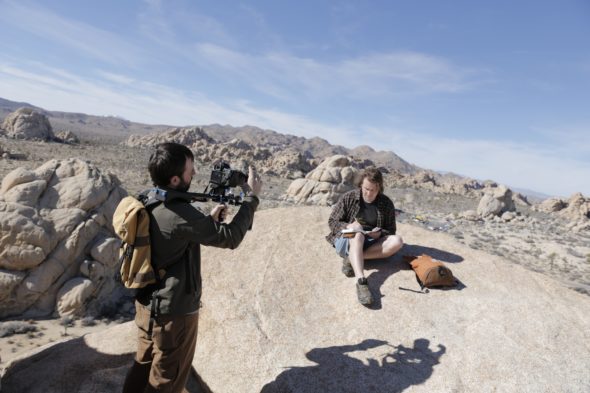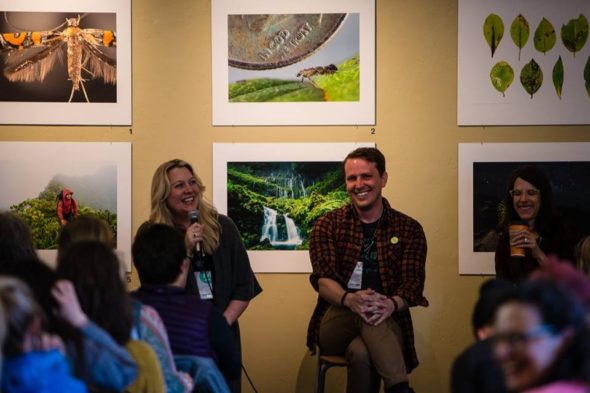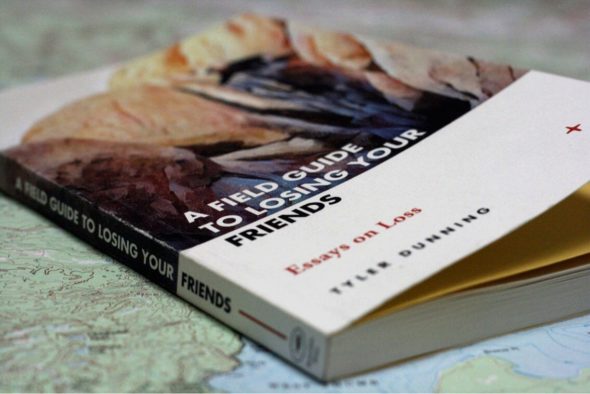Two years ago, my former roommate and film director Chad Clendinen asked if he could transform my book, A Field Guide to Losing Your Friends, into a short film. I agreed, not expecting the request to come to fruition (artists can be flaky). To my surprise, the film was fully produced, successful at festivals, and our journey is still unfolding. I’ve learned a lot in the process, stepping out of my isolated literary bubble and into the complex realm of motion pictures. In fact, the two worlds aren’t all that dissimilar—both are perplexing and frustrating to the newcomer. I made a lot of mistakes along the way, especially in my attempts to get the film in front of a wider audience. To save you from similar troubles, here are five tips to improve your chances of acceptance when submitting to film festivals:

The author and Chad Clendenin at Joshua Tree.
1. Slow down
It’s easy to get caught up in the excitement of completing a project—the natural inclination is to share your finished work as quickly as possible, but it’s important to shelter the film until it’s truly ready. For example, a submission deadline in not a good enough reason to submit half-completed work with the promise of later improvement. We submitted our film to the Banff Mountain Film Festival when the film was still under production and were flat out rejected. We submitted the next year, after gaining Banff’s praise for the completed work (via Twitter), only to be notified of rules we’d failed to notice: you can’t submit the same project to Banff twice. We’d shot ourselves in the foot because we were too eager and didn’t read the fine print.
Don’t release online (via Vimeo, YouTube, et al.) until festival opportunities have run their course because you may also disqualify your project from submission if it’s already had an online release; many festivals prefer films to be a premiere and, a lot of the time, this can be compromised by an online release. You can avoid these and similar problems by having a clear trajectory of where you want to show your film (with attention to their rules and regulations) and what you want to achieve by submitting to film festivals.
2. Know why you’re submitting to film festivals
Set yourself apart by establishing specific career development goals. Thousands of filmmakers are vying to show at festivals across the globe, but many can’t articulate why they want to—they are doing it just for the sake of doing it. This becomes an expensive hobby quickly (with each festival submission costing somewhere between $25 and $75).
Let the purpose of your submission dictate the strategy. If you’ve produced a feature-length film you hope to get acquired by a large distribution company, submit to festivals with a history of drawing distributors (Sundance, for example). For someone like me with a short film, major distribution was unlikely because a company like Netflix has no interest in a fourteen-minute piece (not yet, at least). Instead, Chad and I have been focusing on getting a Vimeo Staff Pick (which draws ample online views), knowing that Vimeo’s staff attends festivals for this very reason. We also appreciated that the likelihood of a Vimeo selection increases if a film has been shown at an Oscar-eligible festival—so we submitted specifically to a few of these festivals (see the dropdown menu here).
As a writer, I had an alternative motive in all this: knowing our film was going to supplement my book, I focused on opportunities with an affiliated book component. Getting accepted into Telluride’s Mountainfilm Festival qualified me for their ‘reading frenzy,’ where I then sold books beside many of my literary heroes—I even got to speak on a panel with Cheryl Strayed and Florence Williams.
3. Don’t be afraid to ask for help
You’re not going to get far in the entertainment industry without the assistance of friends, colleagues, and mentors. Don’t be afraid to ask people to help move your project along—if you believe in your project, others will too. This could mean asking a select audience for feedback: Chad and I held several pre-screenings with close friends who critically evaluated our story craft and production elements (my first voice over was terrible and they let me know it).

The author with Cheryl Strayed and Florence Williams at Mountainfilm
Trading is another great way to get work done on a tight budget. Chad was a one-person production team on the film but knew a colleague who could perfect the sound engineering, so Chad reached out. The colleague agreed to the work in exchange for several hours of Chad’s animation skills. We also utilized Kickstarter to encourage community while funding the film. In all my artistic endeavors, I’ve never felt more supported than when we asked the public for money—because people want to help in quantifiable ways.
4. Network, network, network
When submitting to film festivals, utilizing connections is essential. Here’s why: art is subjective, and these festivals get inundated with submissions. Volunteers often pre-screen films, and it’s hard to know if the top decision-makers ever even see your work. Knowing someone can move your film past this screener phase–theirs can be the deciding referral that tips your submission toward acceptance. We had a connection at Mountainfilm, so we swallowed our pride, asked this friend to put in a good word for us, and it worked.

The book that inspired the film
“Networking” feels like a slimy word but it’s important to remember that everyone at film festivals is there for the same reason: a love of cinema. Be yourself and let your passion for the craft drive your interactions—who knows where the new connections could lead? If you know some of the other participants that will be attending the festival, research their work (there is nothing more flattering). These connections often compound to increase the success of your film. For example, getting into one film festival can open the door to many others, with smaller festivals sending scouts to larger festivals. Because Chad and I premiered at Mountainfilm, we had four other festivals approach us to attend their festivals too (and forgo the arduous submission process).
5. Be grateful
Everyone is overworked and underpaid in this industry. Showing a little gratitude and appreciation goes a long way. Thank everyone from the volunteers (especially the volunteers) to the festival directors. You’ll be remembered for this because, ideally, you’ll be seeing these same people year after year. And they’ll be more interested in accepting any future projects if they recall you as a kind human being.
Once you’ve finished submitting your to film festivals, get prepared for what to expect when you arrive.

The author at Yosemite

